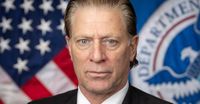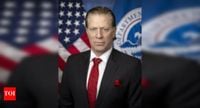As the 2025 Atlantic hurricane season began on June 1, the Federal Emergency Management Agency (FEMA) found itself embroiled in controversy following a perplexing remark by its acting head, David Richardson. During a daily operational briefing attended by hundreds of FEMA staffers and interagency partners on June 2, Richardson reportedly said, "I didn’t know the US had a hurricane season." The comment, whether made in jest or seriousness, left many within the agency confused and concerned about FEMA's preparedness under his leadership, especially with forecasts predicting an above-average hurricane season featuring up to 10 hurricanes.
Richardson, a former Marine Corps artillery officer and the Assistant Secretary for the Department of Homeland Security's Countering Weapons of Mass Destruction Office, assumed the role of acting FEMA Administrator in early May 2025. His appointment came after the sudden dismissal of his predecessor, Cameron Hamilton, who had publicly emphasized FEMA's vital role in disaster response—a stance reportedly at odds with the Trump administration's vision of downsizing or even eliminating the agency.
Despite Richardson’s military background and experience within the Department of Homeland Security (DHS), his leadership style has raised eyebrows. Reports indicate that in earlier meetings, he told staff, "Don't get in my way... I will run right over you," signaling a top-down approach that unsettled some employees. The recent hurricane season briefing remark only intensified apprehensions about his familiarity with emergency management and FEMA’s mission.
Adding to the unease, Richardson announced during the briefing that FEMA would not be implementing a new disaster response plan this year, despite earlier promises. He cited a desire not to preempt recommendations from the FEMA Review Council—an oversight body established by President Trump that includes DHS Secretary Kristi Noem, governors, and other officials. Consequently, FEMA will rely on last year’s disaster response plan, a decision that has raised concerns given the predicted severity of the upcoming storm season.
Staff reductions and funding cuts have further complicated FEMA’s readiness. Since the start of the Trump administration in January, FEMA has lost about a quarter of its full-time staff, including one-fifth of its coordinating officers who manage large-scale disaster responses. These departures followed pressure from the Department of Government Efficiency, previously led by Elon Musk, which sought a massive culling of federal workers. The agency’s short-term disaster response and recovery employees, who now make up approximately 40 percent of FEMA’s workforce, were retained in May after Richardson’s request was approved by Secretary Noem. However, concerns persist about whether this staffing structure can adequately support the agency’s critical operations during peak disaster periods.
Moreover, the National Oceanic and Atmospheric Administration (NOAA), a key federal agency responsible for disaster forecasting, has faced significant cuts in funding and staff, resulting in a loss of experienced personnel and a worrying “brain drain.” This erosion of capacity threatens the accuracy and timeliness of hurricane predictions, which are vital for FEMA’s preparation and response efforts.
The Department of Homeland Security issued a statement clarifying that Richardson’s comment was intended as a joke, emphasizing that FEMA remains laser-focused on disaster response and protecting the American people. The statement highlighted an ongoing shift under Secretary Noem and Richardson from a "bloated, DC-centric dead weight to a lean, deployable disaster force that empowers state actors to provide relief for their citizens." Nevertheless, the timing of the remark and the decision to forgo a new disaster plan have not assuaged critics.
Lawmakers expressed sharp criticism. Senate Majority Leader Chuck Schumer posted on social media, "And I’m unaware of why he hasn’t been fired yet," while Representative Bennie Thompson, senior Democrat on the House Homeland Security Committee, stated, "Suffice to say, disaster response is no joke. If you don’t know what or when hurricane season is, you’re not qualified to run FEMA. Get someone knowledgeable in there.”
The U.S. Atlantic hurricane season officially runs from June 1 through November 30, a period when warm ocean waters and atmospheric conditions combine to produce tropical storms and hurricanes that can devastate coastal and inland areas alike. The season’s peak typically falls between mid-August and late September, when the risk of severe storms is highest. Hurricanes are categorized from 1 to 5 based on wind speeds, with Category 5 representing the most destructive.
Hurricanes not only bring powerful winds but also heavy rains, flooding, tornadoes, and widespread infrastructure damage. Even inland communities, often mistakenly considered safe, can suffer severe impacts. Given these risks, preparedness is paramount.
Richardson’s recent memo to FEMA staff signaled further shifts in agency policy. He canceled FEMA’s multi-year strategic plan, asserting it contained "goals and objectives that bear no connection to FEMA accomplishing its mission." He promised a new 2026-2030 strategy would be developed to align directly with FEMA’s essential tasks.
Despite the controversies and internal challenges, FEMA faces an urgent mandate. Hurricanes annually cause dozens of deaths and cost hundreds of millions of dollars across the United States. With climate change intensifying storm severity and frequency, the agency’s role is more critical than ever.
As the 2025 hurricane season unfolds, FEMA’s capacity to respond effectively will be tested. The agency’s leadership, staffing, and strategic direction will be under close scrutiny from staff, lawmakers, and the public alike. The question remains: Is FEMA ready to meet the challenges ahead?





